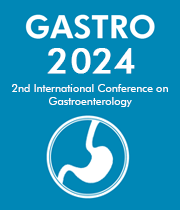Title : Unveiling gender disparities in acute pancreatitis: A comprehensive analysis of mortality rates among hospitalized patients with infected necrosis
Abstract:
Background:
Infected necrosis in acute pancreatitis is associated with significant morbidity and mortality. The development of infection within necrotic pancreatic tissue can lead to a cascade of complications, and managing these complications is crucial for improving outcomes. We aim to analyze the gender difference as a predictor of outcomes in admitted patients with the complication of infected necrosis.
Methods:
The data was extracted from the National Inpatient database of 2016 to 2020 to identify patients admitted with acute pancreatitis with infected necrosis with ICD-10-codes K8522, K8512, K8502, K8532, K8582 and K8592. The weights were applied to make the sample population more representative of the national sample. The Multivariable logistic regression was conducted to determine the distribution and outcome of acute pancreatitis with complication by gender. The outcome included acute kidney failure, respiratory insufficiency/arrest, septicemia, acute pulmonary embolism, shock and mortality.
Results:
The study included 6,255 patients with acute pancreatitis with infected necrosis of which 2015 (32.21%) were females and 4240 (67.79%) males, mean age (52.5 years±20.35). 5.33% of the admitted patients had a secondary diagnosis of illicit drug use, while 31.45% had a secondary diagnosis of alcohol use disorder and 22.61% were obese. A total of 550 (8.8%) of the admitted patients died of which 170 (30.91%) were females and 380 (69.09%) were males. 12.22% of the admitted patients developed acute kidney failure as a complication,10.01% septic shock, and 8.65% acute respiratory failure. While there was no significant difference in mortality outcome between males and females OR=1.04, CI 0.62-1.76 p-value,0.89, septicemia and acute pulmonary embolism, Males were less likely to get acute kidney failure compared to females, Odds Ratio (OR=0.69: CI 0.54-0.89; p-value, 0. 0044. Also, Males were more likely to get respiratory arrest OR=1.538, CI:1.20-1.98 p- 0.0008, and septic shock OR=1.76 CI:1.33-2.34 compared to their female counterparts.
Conclusion:
The analysis of acute pancreatitis with infected necrosis reveals a noteworthy gender disparity in the outcome, with a higher incidence of complications leading to mortality in males compared to females. The data underscores the importance of recognizing and addressing gender-specific factors that may contribute to the severity of the disease and its complications. Efforts to enhance early detection, intervention, and personalized treatment strategies may contribute to improving outcomes for both male and female patients with acute pancreatitis and infected necrosis. Additionally, ongoing research in this area may uncover novel insights into the underlying factors contributing to the observed gender differences, ultimately informing more targeted and effective clinical interventions.
Audience Take Away:
-
Job Relevance: Enhance patient care strategies. Understanding gender disparities in mortality rates among patients with acute pancreatitis and infected necrosis can aid clinicians in tailoring treatment plans and interventions to improve outcomes for both male and female patients.
-
Research and Teaching Utility: This study may provide a foundation for further exploration into the underlying factors contributing to gender disparities in acute pancreatitis outcomes, as well as the development of more gender-specific treatment protocols.
-
Practical Solutions: By uncovering gender-specific patterns in mortality rates among patients with acute pancreatitis and infected necrosis, this research can inform the development of targeted interventions aimed at reducing disparities and improving overall patient outcomes.
-
Design Efficiency and Accuracy: While this research may not directly impact design processes, it could indirectly contribute to improving the design of healthcare systems and protocols.
Other Benefits:
-
Raise awareness about the importance of considering gender differences in healthcare research and clinical practice.
-
Foster interdisciplinary collaboration between healthcare professionals, researchers, and educators.
-
Provide valuable insights into the complex interplay between gender, disease pathophysiology, and treatment outcomes.
-
Contribute to ongoing efforts to reduce healthcare disparities and improve health equity across diverse patient populations.



